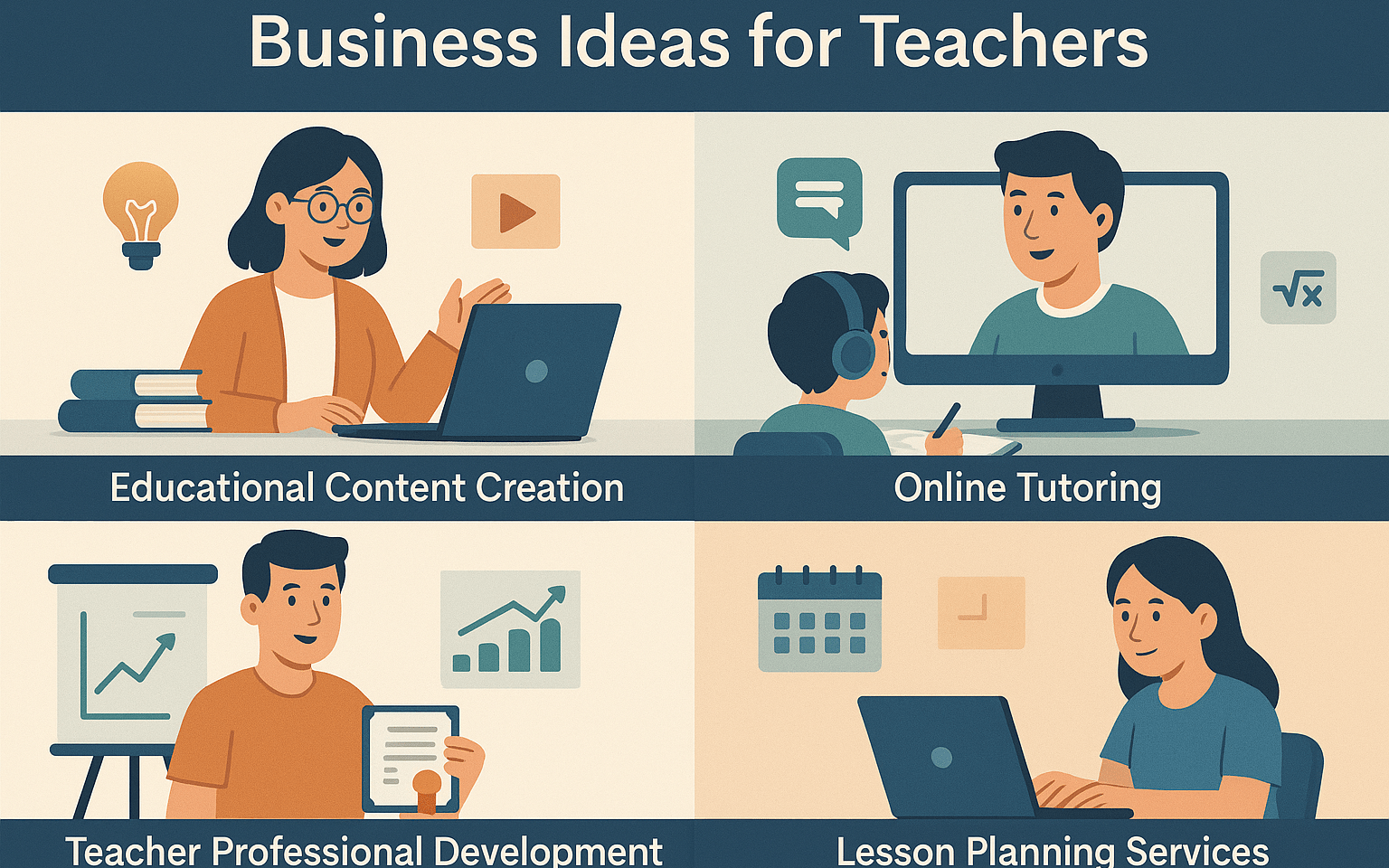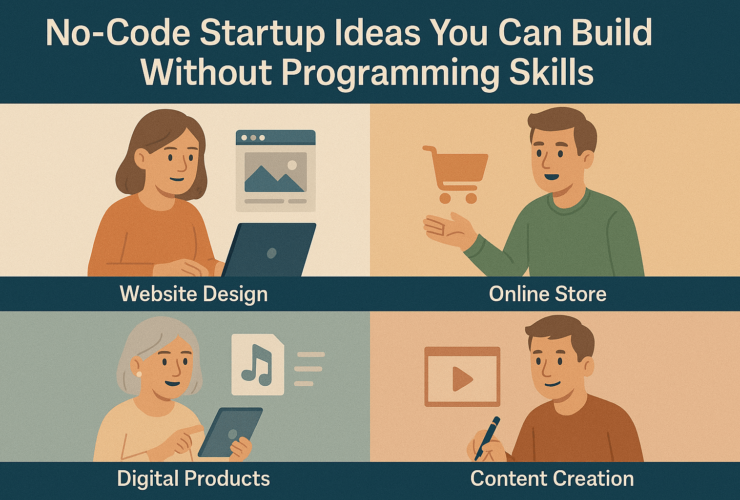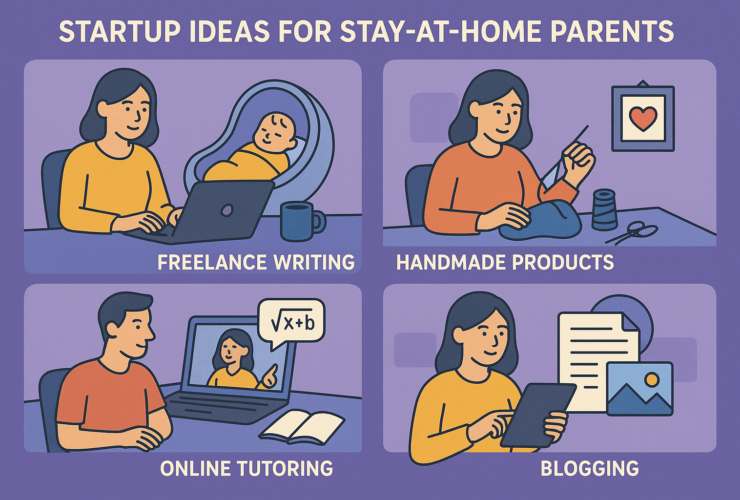30 Business Ideas for Teachers and Educators
Teachers possess a unique combination of skills that make them natural entrepreneurs. Communication, organization, creativity, and the ability to break down complex ideas into digestible pieces – these talents translate beautifully into business ventures. Having spent years in both education and the startup world, I’ve witnessed countless educators transform their classroom expertise into thriving enterprises.
The education sector has evolved dramatically. Traditional teaching roles no longer define the boundaries of what educators can achieve. Many teachers seek additional income streams, flexible schedules, or complete career pivots. The entrepreneurial path offers all three possibilities.
This comprehensive guide explores 30 business opportunities specifically designed for educators. Each idea leverages your existing skills while opening new revenue streams. Whether you’re looking for a side hustle or a full career change, these concepts provide actionable starting points.
Business Categories Overview
| Category | Investment Level | Time to Launch | Potential Revenue |
|---|---|---|---|
| Online Courses | Low | 1-3 months | $1,000-$50,000/month |
| Consulting | Very Low | 2-4 weeks | $75-$500/hour |
| Tutoring | Low | 1-2 weeks | $25-$150/hour |
| Curriculum | Medium | 2-6 months | $5,000-$100,000/project |
| EdTech | High | 6-18 months | $10,000-$1M+/year |
Online Course Creation and Digital Education
1. Subject-Specific Online Courses
Transform your teaching expertise into comprehensive online courses. Platforms like Teachable, Thinkific, and Udemy make course creation accessible. Math teachers can create algebra mastery courses. English teachers might develop writing workshops. Science educators can build lab simulation programs.
Success depends on identifying specific pain points. Instead of “General Math Help,” focus on “Algebra Word Problems for 8th Graders.” Narrow niches attract dedicated audiences willing to pay premium prices.
2. Test Preparation Services
Standardized tests create consistent demand. SAT, ACT, GRE, and professional certification exams require specialized preparation. Your understanding of learning styles and test-taking strategies provides competitive advantages.
Consider creating comprehensive prep packages. Include practice tests, video explanations, and one-on-one coaching sessions. Bundle different price points to capture various market segments.
3. Language Learning Programs
ESL teachers possess valuable skills for online language instruction. Create conversational English courses for business professionals. Develop pronunciation guides for specific industries. Build cultural competency training for international students.
The global language learning market exceeds $60 billion annually. Remote work trends increase demand for professional language skills.
4. Skill-Based Workshops
Teachers master numerous transferable skills. Public speaking, presentation design, classroom management, and conflict resolution apply across industries. Package these abilities into corporate training programs.
Workshop topics might include “Effective Communication for Remote Teams” or “Presentation Skills for Sales Professionals.” Corporate clients pay significantly more than individual students.
Educational Consulting and Advisory Services
5. School District Consulting
Districts constantly seek external expertise. Curriculum alignment, teacher professional development, and technology integration require specialized knowledge. Your classroom experience provides credibility that pure consultants lack.
Specialization increases earning potential. Focus on specific areas like special education compliance, STEM integration, or literacy improvement. Build case studies demonstrating measurable outcomes.
6. Educational Technology Consulting
Schools struggle with technology implementation. Help districts evaluate software options, train teachers, and develop integration strategies. Your understanding of both pedagogy and practical classroom needs creates unique value.
EdTech companies also need educator consultants. Provide product feedback, create training materials, and validate educational approaches. These relationships often lead to ongoing partnerships.
7. Homeschool Support Services
The homeschool population grows annually. Parents need curriculum guidance, assessment tools, and educational resources. Your professional expertise reassures nervous homeschooling families.
Offer comprehensive support packages. Include curriculum selection, progress tracking, and parent coaching. Create online communities where homeschool families can connect and share resources.
8. Special Education Consulting
Special education requires specialized knowledge. IEP development, accommodation strategies, and behavioral interventions demand expert guidance. Schools often lack sufficient internal expertise.
Certification in special education opens additional opportunities. Provide training for general education teachers, develop accommodation resources, and support families navigating special education systems.
Tutoring and Academic Support
9. Online Tutoring Platform
Create your own tutoring platform or join established networks. Wyzant, Tutor.com, and Varsity Tutors connect educators with students. Specialization in specific subjects or grade levels increases hourly rates.
Consider group tutoring sessions. Lower per-student costs while maintaining reasonable hourly earnings. Four students paying $25 each generates $100 per hour.
10. Academic Coaching Services
Academic coaching differs from traditional tutoring. Focus on study skills, time management, and learning strategies rather than subject-specific content. Many students struggle with organization more than comprehension.
Target college-bound high school students and college freshmen. These populations face significant academic transitions. Parents invest heavily in their children’s educational success.
11. Executive Function Training
Executive function skills become increasingly important. Working memory, cognitive flexibility, and inhibitory control affect academic performance. Many students need explicit instruction in these areas.
Develop structured programs addressing specific executive function deficits. Create measurable goals and track progress systematically. Parents appreciate data-driven approaches.
12. College Application Support
College admissions grow increasingly competitive. Students need guidance with essays, applications, and interview preparation. Your writing skills and educational background provide valuable perspectives.
Offer comprehensive packages including essay coaching, application review, and interview preparation. Early planning services for underclassmen create long-term client relationships.
Curriculum Development and Educational Materials
13. Custom Curriculum Design
Schools need tailored curriculum solutions. Standard textbooks don’t address every community’s needs. Create custom materials aligned with specific standards and local requirements.
Focus on underserved subjects or populations. STEM curricula for elementary schools, social-emotional learning programs, or culturally responsive teaching materials fill market gaps.
14. Educational Resource Creation
Teachers constantly seek quality resources. Lesson plans, activity sheets, and assessment tools save preparation time. Platforms like Teachers Pay Teachers enable resource monetization.
Success requires consistent output and marketing. Build brand recognition through social media and educator networks. High-quality resources generate passive income over time.
15. Textbook and Workbook Development
Traditional publishing offers substantial revenue potential. Partner with established publishers or self-publish through platforms like Amazon KDP. Your classroom experience provides authentic perspectives.
Identify curriculum gaps in your subject area. Create supplementary materials addressing specific standards or skills. Pilot materials in classrooms before broader publication.
16. Assessment Tool Development
Effective assessment drives learning. Schools need varied assessment options beyond traditional tests. Create rubrics, performance tasks, and portfolio systems.
Formative assessment tools particularly valuable. Quick checks for understanding, exit tickets, and progress monitoring systems help teachers adjust instruction immediately.
Educational Technology and Innovation
17. Educational App Development
Mobile learning continues expanding. Educational apps provide convenient, engaging learning experiences. Your pedagogical knowledge ensures educationally sound design.
Start with simple concepts before complex applications. Flashcard apps, quiz generators, or progress tracking tools require less technical expertise. Partner with developers if coding isn’t your strength.
18. Learning Management System Development
Schools need user-friendly LMS solutions. Existing platforms often lack educator-friendly features. Design systems prioritizing teacher workflow and student engagement.
Focus on specific niches initially. Elementary schools have different needs than high schools. Special education requires unique accommodation features.
19. Virtual Reality Educational Experiences
VR transforms education by providing immersive experiences. History students can visit ancient Rome. Biology students can explore cellular structures. Science students can conduct virtual experiments.
Collaborate with VR developers to create educational content. Your subject expertise ensures accurate, engaging experiences. Schools increasingly invest in VR technology.
20. Artificial Intelligence Tutoring Systems
AI personalizes learning experiences. Adaptive systems adjust difficulty based on student performance. Intelligent tutoring systems provide immediate feedback.
Work with AI developers to create subject-specific tutoring programs. Your understanding of learning progressions ensures appropriate skill sequences.
Writing, Publishing, and Content Creation
21. Educational Blog Development
Educational blogs build authority and generate revenue. Share teaching strategies, classroom management tips, and curriculum ideas. Monetize through advertising, affiliate marketing, and sponsored content.
Consistency drives blog success. Publish regularly and engage with readers. Build email lists for direct communication with your audience.
22. Children’s Book Writing
Teachers understand child development and reading levels. Create engaging stories that teach important concepts. Picture books, chapter books, and educational series offer different opportunities.
Self-publishing platforms lower barriers to entry. Amazon KDP, IngramSpark, and other services handle printing and distribution. Focus on quality illustrations and compelling narratives.
23. Educational Podcast Production
Podcasts reach busy educators during commutes and planning periods. Share teaching tips, interview experts, and discuss educational trends. Monetize through sponsorships and premium content.
Consistency matters more than perfection initially. Regular publishing schedules build loyal audiences. Engage with listeners through social media and email.
24. Professional Writing Services
Educators possess strong writing skills. Offer content creation services for educational companies, schools, and nonprofit organizations. Grant writing, curriculum documentation, and marketing materials provide opportunities.
Specialization increases rates. Focus on specific industries or content types. Build portfolios demonstrating expertise and results.
Training, Workshops, and Professional Development
25. Teacher Professional Development
Continuing education requirements create consistent demand. Develop workshops addressing current educational challenges. Social-emotional learning, technology integration, and differentiated instruction remain popular topics.
Offer both in-person and online options. Recorded sessions provide passive income opportunities. Create certification programs for specialized skills.
26. Corporate Training Programs
Business skills learned in classrooms transfer to corporate environments. Presentation skills, communication strategies, and team building translate across industries.
Develop programs addressing specific corporate needs. Remote work communication, leadership development, and customer service training offer high-value opportunities.
27. Parent Education Workshops
Parents need guidance supporting their children’s education. Homework help strategies, reading support, and educational technology training address common concerns.
Partner with schools and community organizations. PTAs, libraries, and community centers provide venues. Online workshops reach geographically dispersed audiences.
28. Educational Leadership Training
School administrators need specialized training. Instructional leadership, budget management, and legal compliance require ongoing education. Your classroom experience provides practical perspectives.
Target aspiring administrators and new principals. These populations actively seek professional development. Create comprehensive leadership development programs.
Assessment and Evaluation Services
29. Educational Testing Services
Schools need external testing expertise. Achievement testing, diagnostic assessments, and program evaluations require specialized knowledge. Your assessment background provides credibility.
Develop standardized procedures and reliable instruments. Schools value data-driven decision making. Provide actionable recommendations based on assessment results.
30. Program Evaluation Services
Educational programs require regular evaluation. Federal grants, state initiatives, and local programs need documentation of effectiveness. Your research skills and educational knowledge create value.
Focus on specific program types or funding sources. Title I programs, special education initiatives, and STEM grants have unique evaluation requirements.
Key Success Factors
Starting any business requires careful planning. Market research validates demand before significant investment. Competitive analysis identifies positioning opportunities. Financial planning ensures sustainability.
Your teaching experience provides several advantages. Communication skills help market services effectively. Organizational abilities support business operations. Professional networks provide initial customers.
Technology amplifies reach and efficiency. Online platforms enable global audiences. Automation handles routine tasks. Data analytics improve decision making.
Scalability separates hobbies from businesses. Create systems enabling growth without proportional time increases. Hire assistants or contractors as demand grows. Develop products generating passive income.
TL;DR
Teachers possess valuable skills easily transformed into profitable businesses. Thirty opportunities span online courses, consulting, tutoring, curriculum development, and educational technology. Success requires identifying specific niches, leveraging existing expertise, and building scalable systems. Start small, validate demand, and grow systematically. Your educational background provides unique advantages in understanding learning processes and student needs.
Q&A
Q: How much money can teachers realistically make from these business ideas? A: Income varies significantly based on specialization, effort, and market demand. Tutoring might generate $25-150 per hour. Online courses can produce $1,000-50,000 monthly. Consulting rates range from $75-500 hourly. Success depends on execution quality and market positioning.
Q: Which business ideas require the least startup investment? A: Tutoring, consulting, and online course creation require minimal upfront costs. Basic computer equipment and internet access suffice initially. Curriculum development and educational technology require more substantial investments for quality outcomes.
Q: How can teachers find time to start businesses while teaching full-time? A: Start with evening and weekend activities. Summer breaks provide extended development time. Gradually transition as business income grows. Many successful educator-entrepreneurs began with small side projects.
Q: What legal considerations should teacher-entrepreneurs address? A: Intellectual property rights, business licensing, and tax implications require attention. Consult attorneys and accountants for specific situations. Some school districts restrict outside employment activities.
Q: How do teachers compete with established educational companies? A: Classroom experience provides authenticity and credibility. Personal connections with educators create marketing advantages. Specialization in specific niches reduces direct competition. Quality and customer service often outweigh size advantages.
Business Readiness Quiz
Question 1: Do you have a specific educational expertise that others frequently ask about?
- A) Yes, colleagues regularly seek my advice on specific topics
- B) Sometimes, but not consistently
- C) No, I don’t have particular specializations
Question 2: Can you dedicate 5-10 hours weekly to business development?
- A) Yes, I can commit consistent time
- B) Maybe, depending on other commitments
- C) No, I don’t have additional time available
Question 3: Do you have basic technology skills for online business operations?
- A) Yes, I’m comfortable with computers and internet tools
- B) Some skills, but need improvement
- C) No, technology intimidates me
Question 4: Are you comfortable marketing yourself and your services?
- A) Yes, I can promote my expertise confidently
- B) Somewhat, but need practice
- C) No, self-promotion feels uncomfortable
Question 5: Do you have financial resources to invest in business startup costs?
- A) Yes, I can invest $500-2,000 initially
- B) Limited funds, but some available
- C) No, I cannot invest money currently
Question 6: Can you handle irregular income while building your business?
- A) Yes, I have savings or stable income
- B) For short periods, but need quick results
- C) No, I need consistent income immediately
Scoring:
- Mostly A’s (5-6): You’re ready to start a business. Choose opportunities matching your expertise and available time.
- Mix of A’s and B’s (3-4): Consider starting with low-risk options like tutoring or consulting while building skills.
- Mostly B’s and C’s (0-2): Focus on skill development and resource building before launching business ventures.
Your teaching experience provides valuable foundation skills. Success depends on matching opportunities with your specific situation and capabilities.




